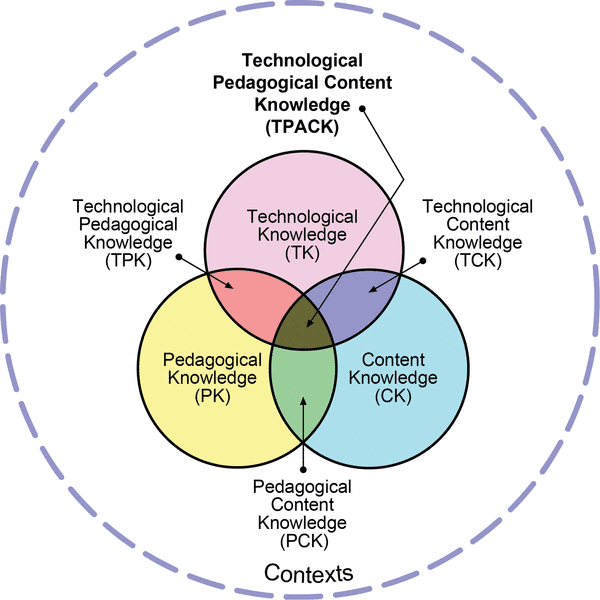Is information technology at the leading edge of teaching practice?
The question of whether information technology is at the leading edge of teaching practice was examined by PERFORMA (Performa is a partnership between 61 Quebec colleges and the University of Sherbrooke, deicated to the PERfectionnement et à la FORmation des MAitres within colleges since 1973) at the Rendez-vous des conseillers pédagogiques during the most recent AQPC Symposium in June 2013. One of the ideas put forward was based on the research of Dr. Matthew J. Koehler, professor in the Educational Psychology and Educational Technology (EPET) program at the College of Education at Michigan State University.
The acronym TPACK stands for Technological Pedagogical Content Knowledge and designates the ability to integrate technology into teaching and learning activities related to a teacher’s discipline. The TPACK skillset reflects Koehler’s conclusions. In the diagram below, it is the equilibrium at the intersection of the three primary skills of teachers (technological, pedagogical and content knowledge). Knowledge and analysis of each of these variables and the interactions between them allow the teacher to assess and develop their teaching practice from different angles.

The ability to integrate technology into discipline-related teaching and learning activities is at the intersection of the three primary skills of teachers (technological, pedagogical and content knowledge).
Primary Skills
Content knowledge: The content expertise of the teacher is not limited to theoretical knowledge of their subject. This expertise extends to skills and attitudes that are part of the professional practice in the field. These practices are constantly changing which implies remaining current through the following:
- Continuing education
- Personal research
- Contact with the workplace
Pedagogical knowledge: Pedagogical expertise comes only through continuing education and personal reflection on the practice of teaching. Educational practice evolves through putting different elements into context:
- Continuing education
- Research
- Experimentation
- Observation
- Exchanges with peers on classroom practices
Technological knowledge: Initially, technological knowledge was limited to the preparation of acetates and operation of a photocopier. Then, audiovisual equipment was added to teaching strategies. Finally, with the advent of computers, the Internet and mobile applications have significantly changed the role of technology in the classroom. Each teacher is changing at their own pace, and many have transferred their skills to their teaching duties.
Overlapping Skills
Pedagogical Content Knowledge: At the intersection of content and pedagogical knowledge, this knowledge is derived from a collective reflection on the most effective teaching strategies in a discipline. Nicole Bizier, a PERFORMA project manager illustrates in an article in
Pédagogie Collégiale (in French) how this knowledge increases through the following strategies:
- Resource analysis
- Professional practices and skills development
- Appreciation of the difficulties faced by students in learning a subject
Technological Content Knowledge: Located at the intersection of technological and content knowledge, this skill is often mentioned in the competency elements and realization contexts of government documents. As this skill evolves with changes within the teaching discipline and technology, teachers must stay current on the professional use of technology within the context of their discipline to remain an expert in their discipline.
Technological Pedagogical Knowledge: This is located at the intersection of technological and pedagogical knowledge. This knowledge will grow gradually through the following:
- Professional commitment
- Continuing education
- A reflective approach to teaching and learning strategies
To this end, the teacher may be guided by the advice of their college’s IT representative.
Integrating Technology into Subject-related Teaching and Learning Activities
According to Koehler, equilibrium for the professional teacher is at the intersection of the three primary TPACK skills. To reach this point, the teacher needs appropriate skills for their own teaching as well as a way of analyzing their own professional development.
Are you close to the professional equilibrium proposed by Matthew Koehler? Discuss this search for balance integrating technologies into the whole picture with colleagues.

